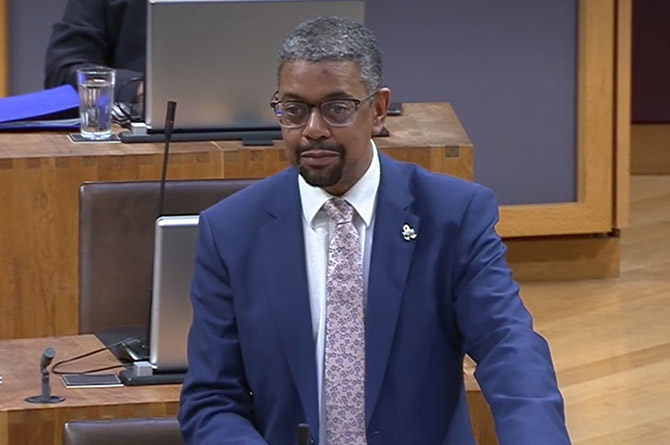Education
Footballers help pupils go global

Soccer can help promote language study: Chris Coleman
PLAYERS from the Wales National Football team have been doing their bit to help pupils concentrate on their modern languages lessons by launching a new learning resource pack linked to this year’s Euros.
The educational resources have been produced as part of the Welsh Government’s Global Futures plan which aims to improve and promote modern foreign languages in Wales.
The Euros- based resources have been published on Hwb, the digital learning platform for schools, so teachers can capitalise on their pupils’ excitement in the run up to June’s tournament, and use the packs to promote the importance and relevance of modern foreign languages.
The new resources were launched by the Wales National Team at an event at the Vale Hotel in Hensol.
Wales’ Football Manager, Chris Coleman said: “I am delighted that we are involved in this programme. From experience I know how important it is to be able to communicate in different languages. I spent time in Spain and in Greece.
“As a squad if we can help and encourage youngsters in any way to learn another language on the back of our success then we will be delighted to offer all our support. Sport, especially football can play a huge part promoting such initiatives”.
Education Minister Huw Lewis said: “As globalisation continues to transform all our lives, footballers, like many of us, are increasingly travelling to, working and living in countries where English is not the first language.
“I want our young people to understand that a sound knowledge of another language can help them get ahead in life, in education and the competitive world.
“Our Global Futures Plan is all about encouraging our pupils to keep on with their language learning and grasp the benefits that a modern foreign language can offer.
“I hope that these resource packs, which we have developed in partnership with the Welsh FA, Arsenal Football club, the British Council, Routes into Languages and leading European language institutes, will support that work and will help to spark our pupil’s interest in and commitment to modern foreign languages.”
Director of British Council Wales, Jenny Scott, said: “We hope these resources will help make language learning fun and engaging for young learners across Wales.
“Sporting heroes have the power to inspire the next generation and I’m sure that the fantastic support the FAW and Wales team have shown for this initiative will help make modern foreign languages much more appealing to young fans as they look forward to an exciting summer.”
The aim of the Welsh Government’s Global Futures plan is to increase the number of learners choosing to study modern foreign languages at GCSE and A-level.
The packs have been produced in six languages, French, Spanish, Italian,German, Portuguese and Welsh, and aim to promote the benefits of modern foreign languages and engage pupils ahead of this year’s tournament.
Education
Vaughan Gething that says too many children are in care

TOO MANY children are being taken from their families, the First Minister admitted, with more than one child in every 100 in Wales now living in care.
Vaughan Gething also warned far too many children and young people do not have a good experience of the care system as he gave evidence to a Senedd scrutiny committee.
John Griffiths raised concerns about an 83% increase in the number of children in care over the past two decades between 2003 and 2022.
The Labour MS for Newport East warned care rates are significantly higher than in England, with “massive, unexplained” variation within Wales.
Mr Gething said: “The picture is still broadly one where too many children are taken into care,” adding that “some people get decent outcomes” but “far too many don’t.”
The First Minister stressed that solving the problem is not as straightforward as the Welsh Government declaring “you cannot take children into the care system”.
Pressed about how he will reverse the trend, Mr Gething said the aim is not only to reduce numbers but to work with, and for, looked-after children to deliver better outcomes.
Alistair Davey, the Welsh Government’s deputy director of social services, told committee members that 25% of children in care are placed outside their home county.
Jenny Rathbone, the Labour MS for Cardiff Central, criticised the pace of change, raising concerns about “constant slippage” in the Welsh Government meeting milestones.
Warning that Wales is an outlier, with the high number of children in care an endemic problem, Ms Rathbone said councils are facing “huge” costs and potential bankruptcy.
“We haven’t got time on our side and children’s lives are being affected,” she stressed.
Urged to get a grip, Mr Gething acknowledged the need for urgency but cautioned that there is not a switch to flick that will change outcomes for children and young people.
Mr Griffiths also raised concerns about educational outcomes for looked-after children, with only 17% getting five GCSEs at ‘C’ or above compared with 54% for pupils generally.
James Evans, the Tory MS for Brecon and Radnorshire, highlighted that looked-after children face significant additional challenges such as moving just before exams.
Recognising that such disruption has a very real impact, Mr Gething said GCSE results for looked-after children reflect the challenges in their lives rather than their ability.
He was not convinced about the need for a specific strategy, echoing Carwyn Jones’ concerns about the Welsh Government becoming a “strategy factory”.
Ms Rathbone pressed the First Minister about concerns the Welsh Government’s “woolly” child poverty strategy lacks ambition and focuses too much on levers outside its control.
She said the children’s commissioner, Audit Wales, the Bevan Foundation and many others are among a chorus calling for clear targets on reducing child poverty.
Mr Gething stressed that poverty will be a key priority for his government, which will refocus on investing in the first 1,000 days of a child’s life.
He said delivering the objectives of the child poverty strategy would make a radical difference to the lives of children and young people.
Warning that the private sector does not deliver the right quality of care and outcomes, the First Minister set out plans to remove profit from the care of looked-after children.
He explained that Dawn Bowden, the newly-appointed social care minister, will bring forward a bill in the week beginning May 20 before the Senedd’s Whitsun recess.
Mark Isherwood, who represents North Wales, stressed that there is no guarantee a non-profit model will prevent money leaving the sector.
The Conservative warned public sector provision could ultimately cost more and deliver less.
Mr Gething said the reforms are not simply about profit motive, but delivering improved outcomes and making better use of the money.
Warning of a crisis in the social care workforce, James Evans raised concerns about an over-reliance on agency staff with high costs “crippling” councils.
The former councillor said social workers face unmanageable workloads, with as many as 40 cases at a time, as he called for a legal maximum on the number of cases.
Mr Gething rejected the suggestion, saying: “What do you do if you reach a limit and you are not legally allowed to take on any extra work if you have another child who needs support?
“Do you say ‘the inn is full, take your luck in the stable’ or do you say ‘actually, we’ve got to find a way to try to manage with the resources we’ve got’?”
Labour’s Jack Sargeant focused on corporate parenting, warning that more than 25% of children moved care placements twice or more in the year to March.
Mr Sargeant, who represents Alyn and Deeside, backed the “bold and brave” decision to proceed with a basic income pilot for care leavers and asked if it could be extended.
Mr Gething would not give a hard-and-fast commitment, saying an evaluation of the project by Cardiff University will report in 2027 which is beyond the next Senedd election.
However, the First Minister told MSs he would be surprised if Labour was not interested in taking the pilot forward with a manifesto commitment in 2026.
“I certainly hope the evidence allows us to do that,” he told the meeting on April 26.
Asked where care-experienced children sit on his list of priorities, Mr Gething stressed that the government’s commitment to a radical reform summit’s declaration is undimmed.
Education
Conservative calls for academies and free schools rejected by Senedd

THE SENEDD has rejected calls to introduce free schools and academies after a report found major challenges in Wales’ education system.
Tom Giffard led a Conservative debate on educational attainment, warning that Wales is consistently at the bottom of UK-wide league tables.
The party’s new shadow education secretary pointed to an Institute for Fiscal Studies (IFS) report on education in Wales which found low outcomes and high levels of inequality.
Mr Giffard told the Senedd the IFS report highlights the pitfalls of the Welsh Government putting all its eggs in the basket of a skills-based approach.
Criticising a failure to measure skills inequalities and pupil progress, he stressed that Wales’ lower performance is due to policy and approach rather than funding or the pandemic.
He said: “It seems the Welsh Government relies on Pisa results to tell the story but then, when those same results are all too disappointing, they are dismissed in equal measure.”
Mr Giffard, who previously worked in a primary school, said declines in Pisa results can be observed in almost every country that has adopted a skills-based approach.
Raising concerns about disappointing Pisa results, the South Wales West MS pointed out that Wales saw the lowest scores in the UK for every subject.
Heledd Fychan, Plaid Cymru’s shadow education secretary, warned that Wales’ schools are understaffed and facing difficult decisions due to budgets being at breaking point.
She criticised implementation of the Welsh Government’s additional learning needs (ALN) reforms, saying schools cannot realise the aims without the budget to bring them to life.
Ms Fychan said Plaid Cymru agreed with much of the Tory motion but her party would not support calls for free schools and academies.
Sam Rowlands described the IFS report as damning, warning that the Welsh Government’s education reforms have been disastrous and have widened inequality.
The Tory MS claimed the reforms are systematically holding back disadvantaged children, saying: “The most remarkable fact is that the performance of disadvantaged children in England is either above or similar to the average for all children in Wales.”
Mr Rowlands added: “The poorest in England’s schools are doing the same or better than the Welsh average, thanks to ambition, the academies and free schools.”
Samuel Kurtz, a fellow Tory, said free schools and academies have driven up standards in England as he argued a Wales roll-out provides an opportunity to improve outcomes.
James Evans, the Conservative MS for Brecon and Radnorshire, highlighted the party’s pledge to get 5,000 more teachers into Wales’ classrooms.
Buffy Williams, the newly elected chair of the Senedd’s education committee, said Wales is undergoing a profound transformation propelled by ALN and curriculum reforms.
The Labour MS for Rhondda stressed the importance of listening to teachers and allowing ample time for the reforms to take root in classrooms across Wales.
Altaf Hussain recounted a conversation he had this week with a headteacher at one of the largest schools in his South Wales West region.
The Conservative said: “The major improvements they have been delivering to attainment and addressing behavioural issues are all at risk because of cuts to funding.
“Vital work undertaken to improve the lives of young people with additional needs could be halted because they cannot afford to continue employing the support workers.”
Lynne Neagle recognised the scale and seriousness of work still ahead to improve Wales’ education system, stressing: “I am not, in any way, complacent about that task.”
Wales’ newly appointed education secretary, who takes over from Jeremy Miles, said sustained improvement in attainment will be among her top priorities.
She told the chamber: “My early focus has been to listen closely to schools and where it is clear that schools seek more scaffolding.”
Ms Neagle said the Welsh Government will work with trade unions and employers to reduce workload and eliminate unnecessary red tape.
The Conservative motion was voted down, 14-35, following the debate on April 24. The motion as amended by the Welsh Government was agreed, 26-23.
Education
Ysgol Greenhill welcomes positive Estyn report

YSGOL Greenhill and Pembrokeshire County Council have welcomed a strong and very positive Estyn report for the school.
Estyn, the education and training inspectorate for Wales, has released its findings following a full inspection of the school, based in Tenby, carried out in January 2024.
The report noted:
- Under the supportive leadership of the Headteacher, staff at Ysgol Greenhill work together effectively to secure a happy and respectful learning community. Together they have developed a culture of openness and collaboration and share an ambitious goal to become a self-improving school.
- Leaders have secured improvements in many important areas of the school’s work, such as pupils’ learning and attitudes and the provision of care and support for pupils’ wellbeing.
- There is a suitably coordinated approach to improving pupils’ literacy, numeracy and digital skills, including support for pupils who have weak basic skills.
- Leaders seek pupils’ views regularly on the quality and suitability of its provision and make changes accordingly. This includes amendments to pupils’ learning experiences and to the provision for developing pupils’ personal and social education.
- Teachers plan their lessons well to ensure that pupils make good progress in their learning, subject knowledge and in developing relevant literacy and numeracy skills. Teaching assistants collaborate well with teachers to ensure that pupils who require support receive beneficial assistance as they work.
- The school has a broad and valuable range of provisions to support pupils’ well-being. These include individual, tailored resource centres that provide learning, behavioural and emotional support as well as a nurture centre for pupils with low attendance. The school also hosts a local authority learning centre for pupils with autistic spectrum conditions.
- The additional learning needs team work relentlessly to ensure that pupils who access these provisions are supported purposefully to enable them to make progress in their learning and social skills.
- Pupils have positive attitudes towards school and their learning. They feel safe and value the friendly and supportive nature of staff. They settle swiftly in lessons and engage well in activities. Pupils value the ‘Ready to Learn’ system which rewards positive behaviour and provides relevant support for any pupil who displays negative behaviour.
- Sixth form pupils are strong ambassadors of the school. They are friendly and polite towards visitors, conduct themselves well and are good role models for the younger pupils. Nearly all sixth form pupils say they are well supported to make progress in their academic, personal and social development. Many benefit well from valuable opportunities to lead and influence aspects of the school’s work.
- Senior prefects run the school’s numerous pupil groups, house captains and deputy captains organise and manage house activities and trained peer mentors support younger pupils with their learning and social skills. Overall, sixth form pupils develop into mature, knowledgeable young people who speak highly of the valuable experiences they have had during their time at school.
Headteacher, David Haynes said: “I am delighted and immensely proud of this report. The school has made consistent progress over recent years and I very much look forward to Ysgol Greenhill being placed amongst the best schools in Wales.

“I must pay tribute to the outstanding staff and governors who have worked relentlessly to ensure that every pupil is valued and that their wellbeing and progress in their learning has been paramount.
“Ysgol Greenhill is a school that our pupils, families and wider community can be justifiably proud of.”
Councillor Guy Woodham, Cabinet Member for Education and Welsh Language, said: “The school has made good progress in the past two years and this is reflected in the inspection report.
“The strong and dedicated leadership of the Headteacher has contributed significantly to the inspection outcome. Alongside this the contribution of the governing body and the support from the local authority has also helped the school to achieve well. I am confident the school will continue to improve and thrive.”
Chair of the Governing Body, Mrs Heulwen Lear added: “I am thrilled that the report recognises that ‘building a supportive and positive working relationship with their pupils is a strong feature of teaching at Ysgol Greenhill’. Many pupils make secure progress in their learning and subject knowledge and understanding.
“Ysgol Greenhill’s values of kindness, respect, empathy and the celebration of diversity are reflected well in its strong commitment to pupils’ personal and social development. Staff care deeply about the well-being of their pupils and are sensitive to their individual circumstances.”
The full report is available online.
-

 News4 days ago
News4 days agoPolice and air ambulances at ‘serious incident’ at West Wales school
-

 Business2 days ago
Business2 days agoLargest Welsh port appoints communications and marketing director
-

 Crime4 days ago
Crime4 days agoPembrokeshire pensioner accused of 17 sexual offences against children
-

 Crime3 days ago
Crime3 days agoAll three school stabbing victims discharged from hospital, police confirm
-

 Community6 days ago
Community6 days agoCounty Hall to offer space for community banking
-

 Crime6 days ago
Crime6 days agoBrian Davis: Wanted on suspicion of commercial burglary
-

 Sport6 days ago
Sport6 days agoSwifts eyes on double.
-

 Community2 days ago
Community2 days agoSuspected explosive device found on west Wales beach



























